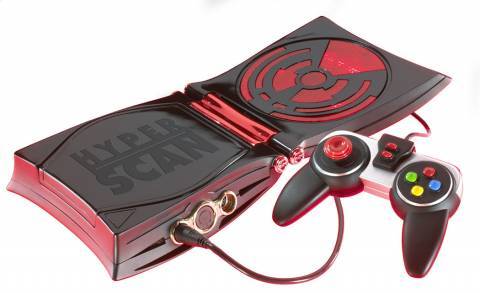


The HyperScan is a home video game console from the toy company Mattel. It uses radio frequency identification (RFID) along with traditional video game technology. The included game was rated "T" (Teen, not suitable for under age 13) and the remaining titles were rated "E10+" (not suitable for under age 10) by the ESRB. The console used UDF format CD-ROMs. The HyperScan has two controller ports, as well as a 13.56 MHz RFID scanner that reads and writes to the "cards" which, in turn, activate features in and save data from the game. Players are able to enhance the abilities of their characters by scanning cards. Games retailed for $19.99 and the console itself for $69.99 at launch, but at the end of its very short lifespan, prices of the system were down to $9.99, the games $1.99, and booster packs $0.99.
The system was sold in two varieties: a cube and a 2-player value pack. The cube box version was the version sold in stores. It included the system, controller, an X-Men game disc, and 6 X-Men cards. Two-player value packs were sold online (but may have been liquidated in stores) and included an extra controller and 12 additional X-Men cards.
The system was discontinued in 2007 due to poor console, game, and card pack sales. It is featured as one of the ten worst systems ever by PC World magazine.
The HyperScan's RFID systems were provided by Innovision Research and Technology plc, a fabless semiconductor design house based in the UK which specializes in RFID systems and chip design.
Games
A partly disassembled HyperScan, showing the RFID scanner.
The games for the system were sold as $20 "Game Packs", which consisted of a game disc accompanied by six game cards (seven for Spider-Man). Additional cards which contained characters, abilities, moves and levels when scanned were part of a six-card "Booster Pack", available for $10/pack. As with most trading card packs, the cards were randomized, meaning a player looking for a certain card to unlock that element of the game may have had to buy multiple Booster Packs in order to get it (while getting multiple cards for another aspect of the game), or trade it for another with a friend, as was likely intended by the Hyperscan's card aspect.
Multiple booster packs were intended for certain games, with X-Men intending to have 102 cards to unlock parts of the game, according to its instruction manual, in separate "red" and "black" series; the latter went unreleased due to the console's cancellation, effectively leaving half the game locked behind a paywall which, barring some kind of hack which would unlock the entire game, can never be lifted.
There were only 5 titles known to have been released, with 2 canceled games.
Background shading indicates canceled games.
# Title Genre(s) Total Cards Booster Packs for complete set and minimum price.
1 Ben 10 Side-scrolling Platformer 80 Released
(6 included + 74) 13 Packs
$150 ($20 Game + $130 Packs)
2 Interstellar Wrestling League Fighting game 54 Released
(6 included + 48)
51 unreleased 8 Packs
$100 ($20 Game + $80 Packs)
3 Marvel Heroes Side-scrolling Platformer 70 Released
(6 included + 64) 11 Packs
$130 ($20 Game + $110 Packs)
4 Spider-Man Side-scrolling Platformer 59 Released
(7 included + 52)
1 unreleased 9 Packs
$110 ($20 Game + $90 Packs)
5 X-Men Fighting game 56 Released
(6 included + 50)
46 unreleased 9 Packs
$139.99 ($69.99 Console and Game + $90 Packs)
6 Avatar: The Last Air Bender ??? ??? ???
7 Nick Extreme Sports ??? ??? ???
X-Men – a fighting game in which two characters face off against each other in self-contained matches similar to Street Fighter. The only game on the console to be rated T for "Teen".
Ben 10 – a side-scrolling adventure quest. The only Cartoon Network-exclusive video game for the system.
Interstellar Wrestling League – a sort of 2v2 fighting game similar to Tekken, but with alien-like characters.
Marvel Heroes – which includes some X-Men characters, is a side-scrolling adventure quest.
Spider-Man – a side-scrolling adventure quest.
The Ben 10 and Spider-Man games are similar to Marvel Heroes.
Homebrew
Though not much development for homebrew games was done on the console, several programmers have created demos and proof-of-concepts. Some of the programs include a CD-Door demo, 3D wireframe demo, and a Bluescale demo.
Hardware specifications
The HyperScan is based off the Sunplus SPG290A system-on-a-chip.
Sunplus SPG290 SoC implementing the S+core 32-bit microarchitecture designed by Sunplus Technology. The S+core instruction set architecture allows use of a 32/16-bit hybrid instruction mode, features Advanced Microcontroller Bus Architecture (AMBA) support and includes SJTAG for In-circuit emulation.
UART, I²C, SPI etc.
Composite video output (SoC supports TFT displays, but the system does not implement it)
16 MB SDRAM system RAM
640×480 native resolution
65,535 colors (RGB 565 mode)
1 USB port
RFID scanner (13.56 MHz)
RFID storage: 96 bytes of user memory + 8 bytes unique ID + 6 bytes of one time programmable memory
Reception
The HyperScan was not a successful console, as it received largely negative reviews from critics and audiences for its games, design, and controls.










